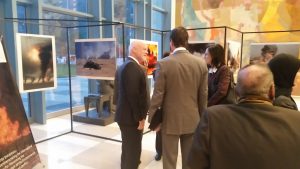Statement by H.E. Mr Peter Thomson, President of the 71st session of the General Assembly, at Photo Exhibition in Observance of the International Day for Preventing the Exploitation of the Environment in War and Armed Conflict: ‘Environmental Impact of the Destruction and torching of the Kuwaiti oil wells during the Gulf War’
31 October 2016
Excellencies,
Ladies and Gentlemen,
It is an honour to be here to commemorate the ‘International Day for Preventing the Exploitation of the Environment in War and Armed Conflict’.
I would like to thank Ambassador Al Otaibi of Kuwait for presenting this deeply moving photographic exhibition, and for inviting me to deliver a few remarks this evening.
The photographs around us are an horrific reminder of the scale and breadth of the destruction caused by armed conflict – which extends well beyond the immediate human suffering, to include long-term damage to the environment, climate, life on land, and to life beneath the water.
Whether it’s through weapons usage, fire, destruction of infrastructure, movement of military vehicles, or pollution, the impact of war on the environment can be devastating, extend well beyond the conflict zone, and often irreparable.
The generational impacts of the damage – to human health, access to natural resources, livelihoods, and the prospects for sustainable peace – are difficult to measure.
The 2001 decision by the General Assembly to declare 6 November the “International Day for Preventing the Exploitation of the Environment in War and Armed Conflict” was an important milestone in our efforts to promote awareness of the importance of protecting the environment in situations of armed conflict.
But 15 years later, it is clear that the environment continues to be a silent victim of modern warfare, and that more work needs to be done.
The International Law Commission’s work to draft principles to enhance the protection of the environment during armed conflict, are a welcome step.
Implementation of the 2030 Agenda for Sustainable Development, and the Paris Agreement which will enter into force this Friday, provide further opportunities to consider ways to prevent and mitigate damage to the environment in armed conflict.
And finally initiatives like this exhibition – that remind the world of the searing impacts of the environmental devastation of war – are essential.
So let us mark this year’s International Day for Preventing the Exploitation of the Environment in War and Armed Conflict by undertaking not to let times of war obscure our broader responsibilities to our planet, people and future generations.
Thank you.


